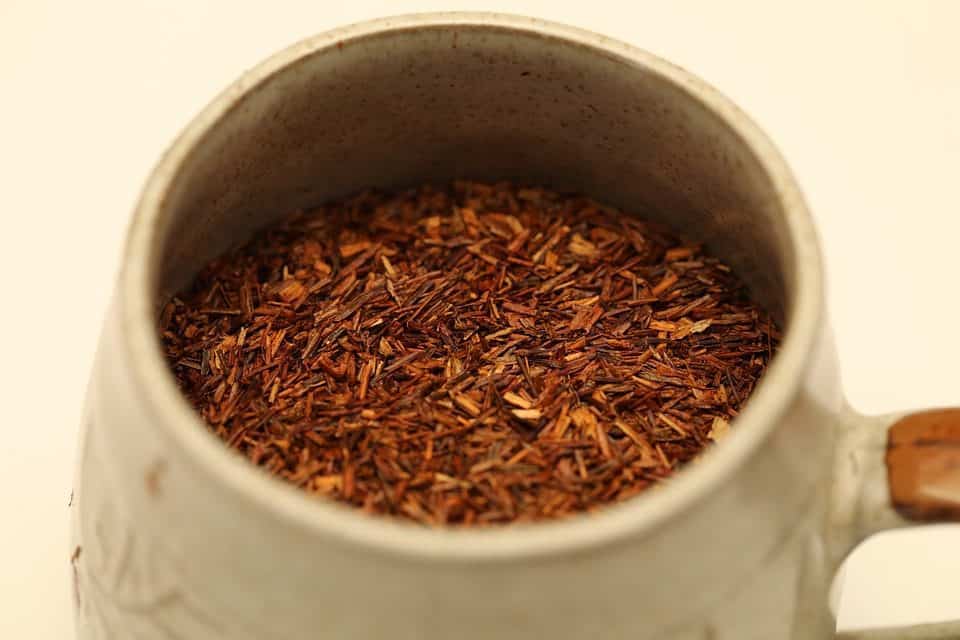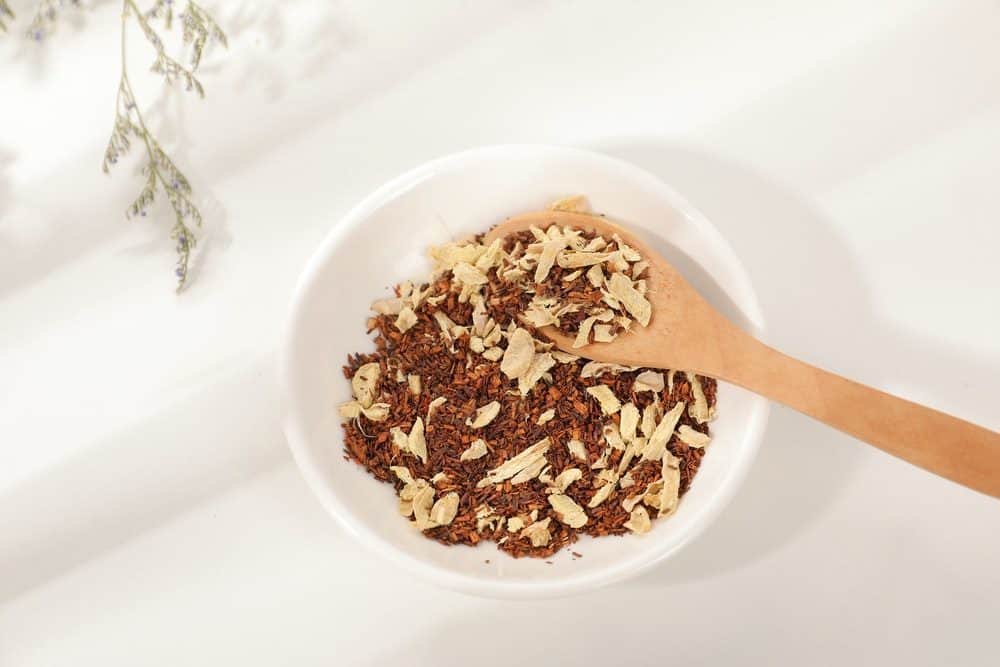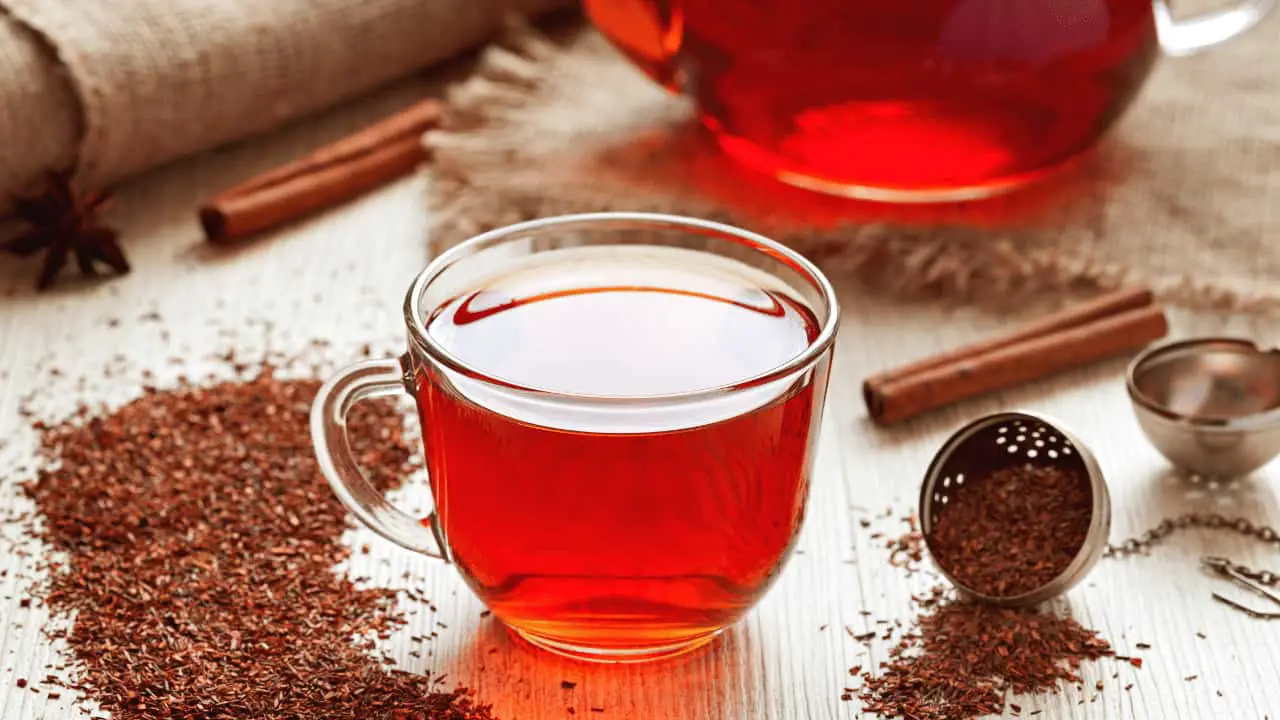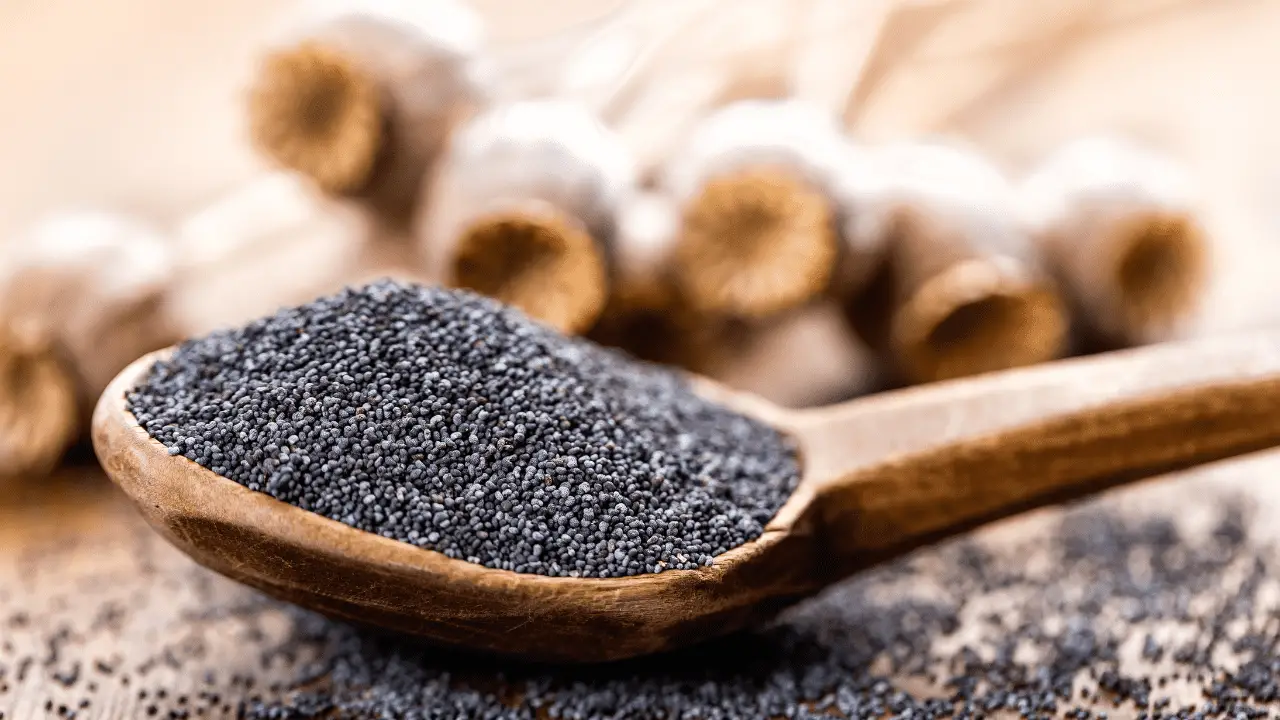Rooibos tea, with its distinctive taste, is becoming an increasingly popular choice amongst tea-drinkers. In addition to having a delicious, deep flavor, rooibos tea is also a great drink due to its wide range of unique health benefits.
Many different teas have different health benefits and we’ve got the low-down on this distinctive tea. We’ve rounded up six ways that drinking it could improve health. Flick the kettle on, and have a read as the first cup starts to brew!
What Is Rooibos Tea?
Rooibos (pronounced roy boss) tea is a herbal tea made from the harvested leaves of the South African aspalathus linearis plant. Also known as red bush tea (‘rooibos’ meaning ‘red bush’ in Afrikaans), rooibos has been enjoyed in South Africa for centuries. It recently gained popularity across the globe as an alternative to green or black tea.
There are a few different types of rooibos tea.
- The most common is red rooibos tea. It’s made from fermented leaves, has a nutty, musky, slightly sweet flavor, and has a deep reddish-brown when brewed. It can be drunk with or without milk.
- Green rooibos tea is made from unfermented leaves and is lighter and more delicate in taste and has around double the number of antioxidants as red tea.
- Flavored rooibos tea is typically made from a combination of red or green rooibos and various flavorings like mint, vanilla, or chamomile.
The Nutrition Of Rooibos Tea – And Why It’s Good For You
There’s a high amount of antioxidants in rooibos tea, giving the drink an increased ability to help protect cells from oxidative stress that occurs naturally
When drunk without milk or sugar added, the tea’s nutritional composition contains no fats, proteins, or carbohydrates. It’s also calorie and caffeine-free. It can be a great choice for those trying to control their calorie intake and an excellent replacement for sugary sodas.
Rooibos tea also has a lot of other micronutrients but those are present only in trace amounts, not enough to offer any significant nutritional benefit. Ultimately, the primary health benefit of this tea comes entirely from its antioxidant compounds.
What Are The Top Health Benefits Of Rooibos Tea?

1 – Naturally Caffeine Free
Unlike many other teas, rooibos is naturally caffeine-free. This means that it doesn’t provide the same stimulant quality that a traditional green or black tea will give, and it also means that rooibos can be drunk as a fluid replacement. Other teas with caffeine can cause the body to become dehydrated because of caffeine’s diuretic effect but rooibos does not have this same effect.
Do remember that excess consumption of caffeine can also cause increased anxiety, sleep issues, insomnia, headaches, heart palpitations, and mood changes. As rooibos tea, you do not need to worry about this risk.
2 – May Benefit Heart Health And Blood Pressure
The antioxidant-rich quality of rooibos tea may help the heart and cardiovascular health. The high flavonol profile of rooibos tea means that it delivers anti-inflammatory effects, which can help protect from heart disease and lower cholesterol.
Besides that, rooibos tea has also been shown to be excellent for blood pressure. This is due to the effect it has on the angiotensin-converting enzyme (or ACE), an enzyme that causes blood vessels to contract, raising blood pressure. As this study indicates, individuals who drank rooibos experienced lower ACE activity between 30-60 minutes after drinking the tea, leading to lower blood pressure. As such, rooibos could be an excellent choice for anyone trying to improve their cardiovascular function.
3 – Great For Diabetes Management
The tea’s levels relatively high levels of aspalathin means that it may help with diabetes management – particularly individuals with type 2 diabetes. In animal studies, aspalathin was demonstrated to be helpful in the management of blood sugar level. Additionally it was also able to suppress the vascular inflammation that can occur from having too-high blood sugar. While further studies need to be done on humans, of course, this is a promising sign.
As rooibos tea has a high level of polyphenols it can further prevent free radical and oxidative damage that can come with diabetes.
4 – Low In Tannins
In traditional black or green teas, there’s generally a high amount of tannins – a type of natural biomolecular compound that can affect your body’s ability to absorb iron. Tannins can also cause various side effects, such as nausea, vomiting, stomach irritation, and even liver damage. So even though they’re naturally occurring, too much of them can hurt. Rooibos tea, however, is very low in tannins – meaning that it’s possible to drink it without any worry of these nasty side effects. A study in 2013 showed that individuals who drank six cups of rooibos tea per day showed no reduction to their iron levels.
Fun fact: Tannins are also present in red wine, and cheaper manufacturers often put synthetic tannins in thier bottle to get that dry mouth feel. But this can is what causes a worse hangover the next morning.

5 – Could Benefit Bone Health
Due to rooibos’ high amount of antioxidants, it can also be excellent for bones. Consuming more antioxidants means that the anti-inflammatory effects do a better job at reducing inflammation – an aspect essential to maintaining good bone health.
In particular, luteolin and orientin – two compounds present in rooibos tea – have been shown to increase mineral levels in bone-related cells. Higher mineral levels mean that bones are healthier and more robust, and less likely to fracture.
Rooibos also contains calcium and magnesium, which are essential for bone health – however, most teas only contain trace levels of these minerals and this is the same for rooibos too.
Unsubstanciated Benefits of Rooibos Tea
Although the main benefits of rooibos tea have been better studied, some are yet to be appropriately studied or verified.
Rooibos Tea & Sleep
There is a pervelant claim that Rooibos tea is an effective sleep aid. While this may be true from a psychological standpoint (a tea at the end of the day is often relaxing), there have been no studies that have proven this. Most of the evidence in this respect is anecdotal.
Rooibos Tea & Weight Loss
Roobios tea is often claimed to be beneficial for weight loss for many reasons that are often not scientifically substantiated. Although the rooibos tea contains zero calories, it doesn’t seem to have any specific weight loss effects in itself, nor does it cause the body to burn more calories. That said, drinking rooibos tea instead of other, more calorific drinks can certainly be a good choice for those looking to lose weight.
Rooibos Tea & Cancer
As cancer is frequently associated with free radicals, drinking tea with ingredients that actively work against this is often recommend. Additionally, folks who recommend rooibos tea for cancer will often state that the tea also contains aspalathin, quercetin and luteolin, which have been shown in test tube studies to kill cancer cells and halt tumor growth. It’s important to remember, though, that human studies are needed in this area. and as of now, none have been done to reasonably make this assertion. Additionally, there are also fruits and vegetables with higher amounts of quercetin and luteolin than in rooibos tea,reiterating the need for a healthy, nutritious, and balanced diet. Regardless, drinking tea with great antioxidant qualities such as red or green rooibos can be an excellent accompaniment to any meal or diet plan.
Are There Any Risks To Drinking Rooibos Tea?
Any problems due to drinking rooibos are rare, and the drink is considered to be a very safe choice.
There have, however, been occasional instances in which individuals have experienced side effects from drinking the tea. For example, rooibos has specific compounds in it that can stimulate estrogen production, according to this study. While this may not be a risk in itself, individuals with cancer and are sensitive to estrogen should seek medical advice before drinking it.
There has also been a case report on one individual who experienced liver damage after drinking a substantial amount of rooibos tea per day. Although this is an isolated case, and it’s only possible that the rooibos tea was directly responsible, it’s a valuable consideration for those with pre-existing liver conditions.
Generally though, for most people, rooibos is a very safe choice for a drink.
How Many Cups Should I Drink A Day?
It may surprise you that the number of cups recommended per day for rooibos tea is quite high. Some sources recommend drinking around six cups of rooibos tea per day to experience its full beneficial effects. Although this seems like a lot, spaced out throughout the day, it’s easy to do. Just make one big pot in the morning and sip as the day goes on. It’s worth bearing in mind that you’ll still experience some health benefits from rooibos if you choose to drink less. Drinking six times per day is by no means a requirement to receive its antioxidant powers!
To make rooibos tea, simply do the same thing with black or green tea: add leaves to a strainer, add hot water, and leave to brew. The longer it brews, of course, the stronger the flavor will be. Rooibos also comes pre-measured in tea bags for convenience. This will not be as effective though as using loose leaves.
The Bottom Line
Rooibos tea – or red bush tea – is a delicious and highly nutritious drink—zero calories, caffeine-free, and high in unique antioxidants. Either red tea or green tea could be an excellent addition to a daily diet. Rooibos tea may offer a range of health benefits for the heart, bones, blood sugar levels, and more. Although some side effects have been reported, for most people, drinking rooibos tea daily is perfectly harmless. So grab a box of South African rooibos and see what all the fuss is about for yourself!







